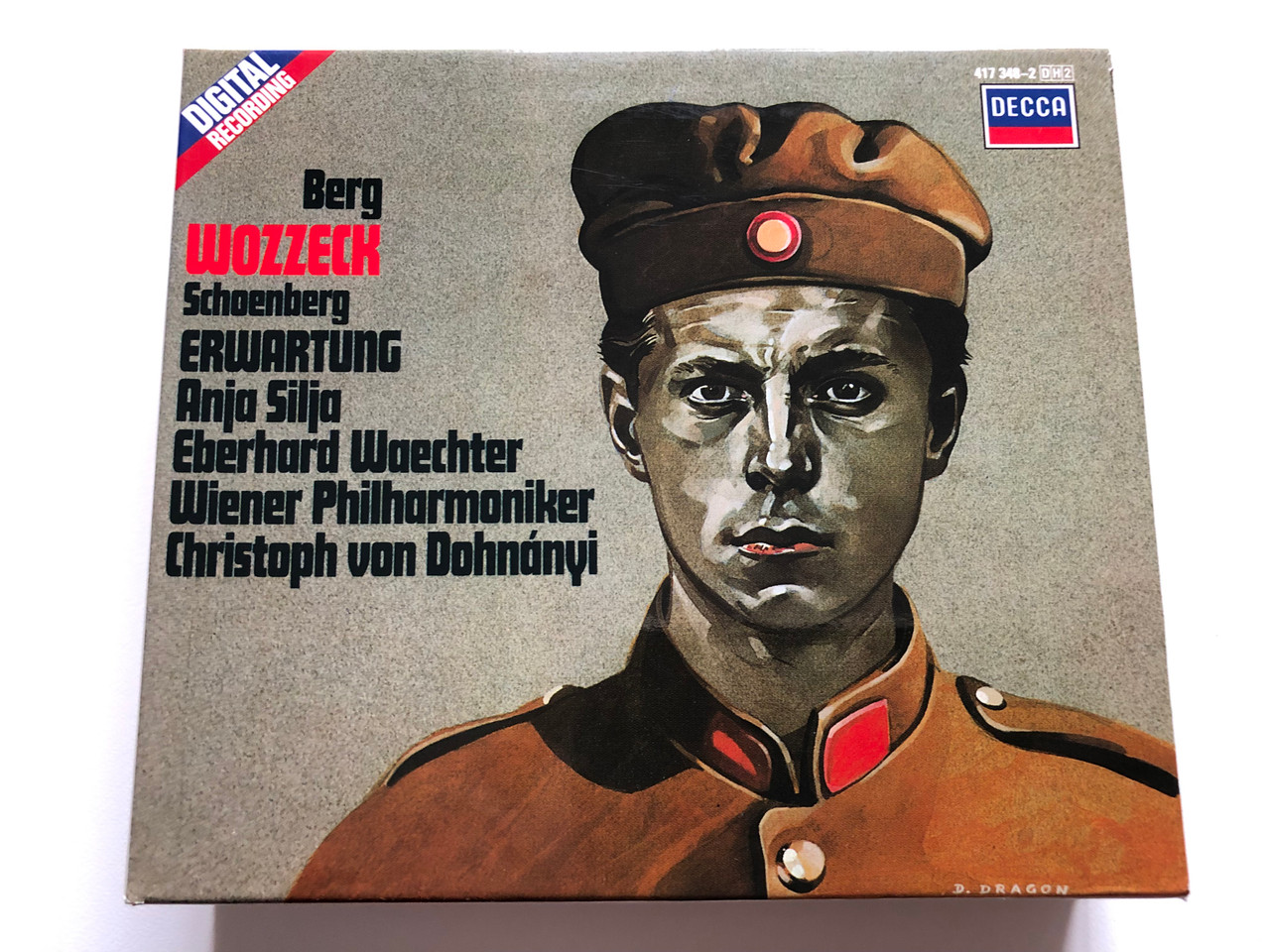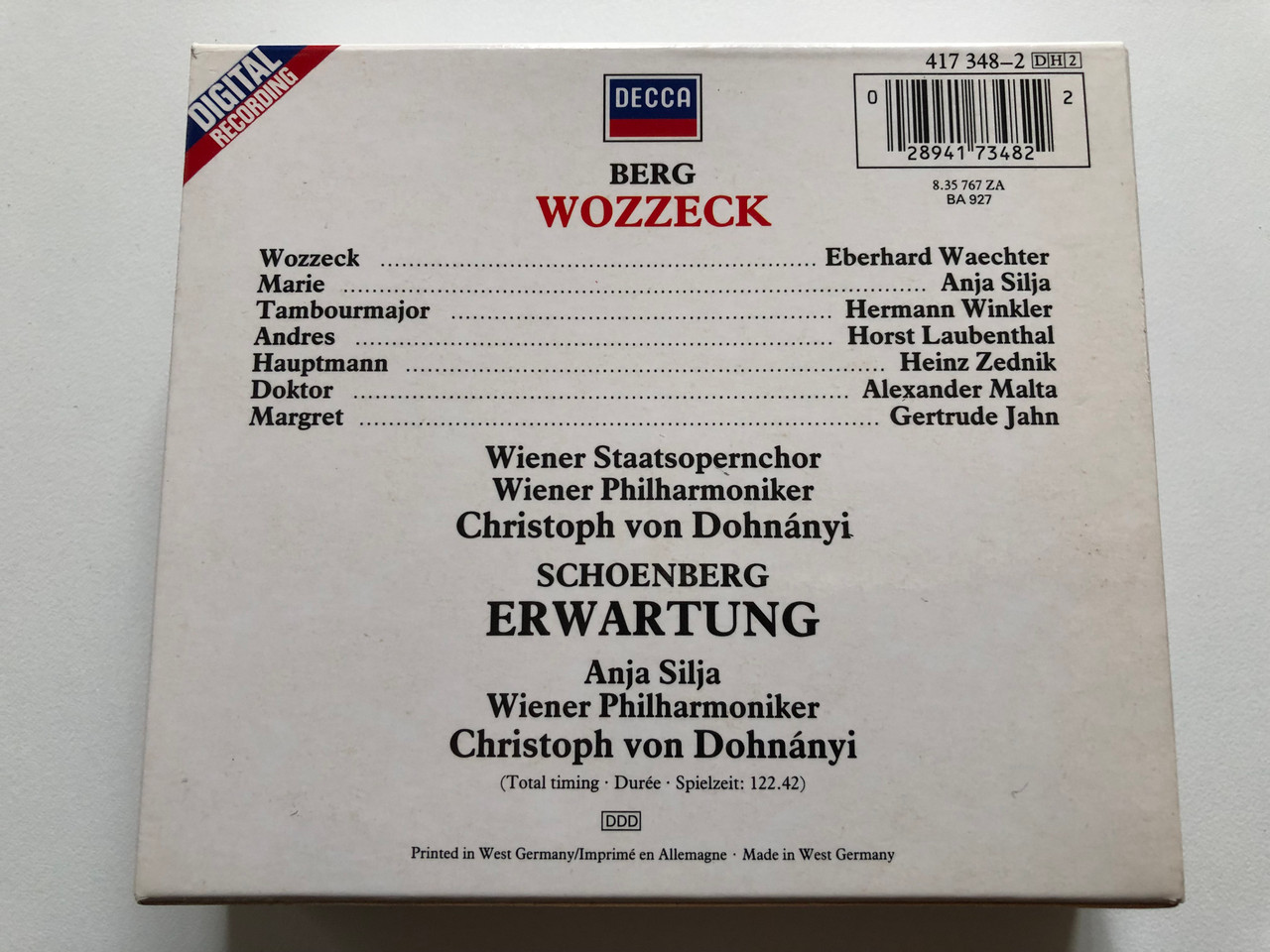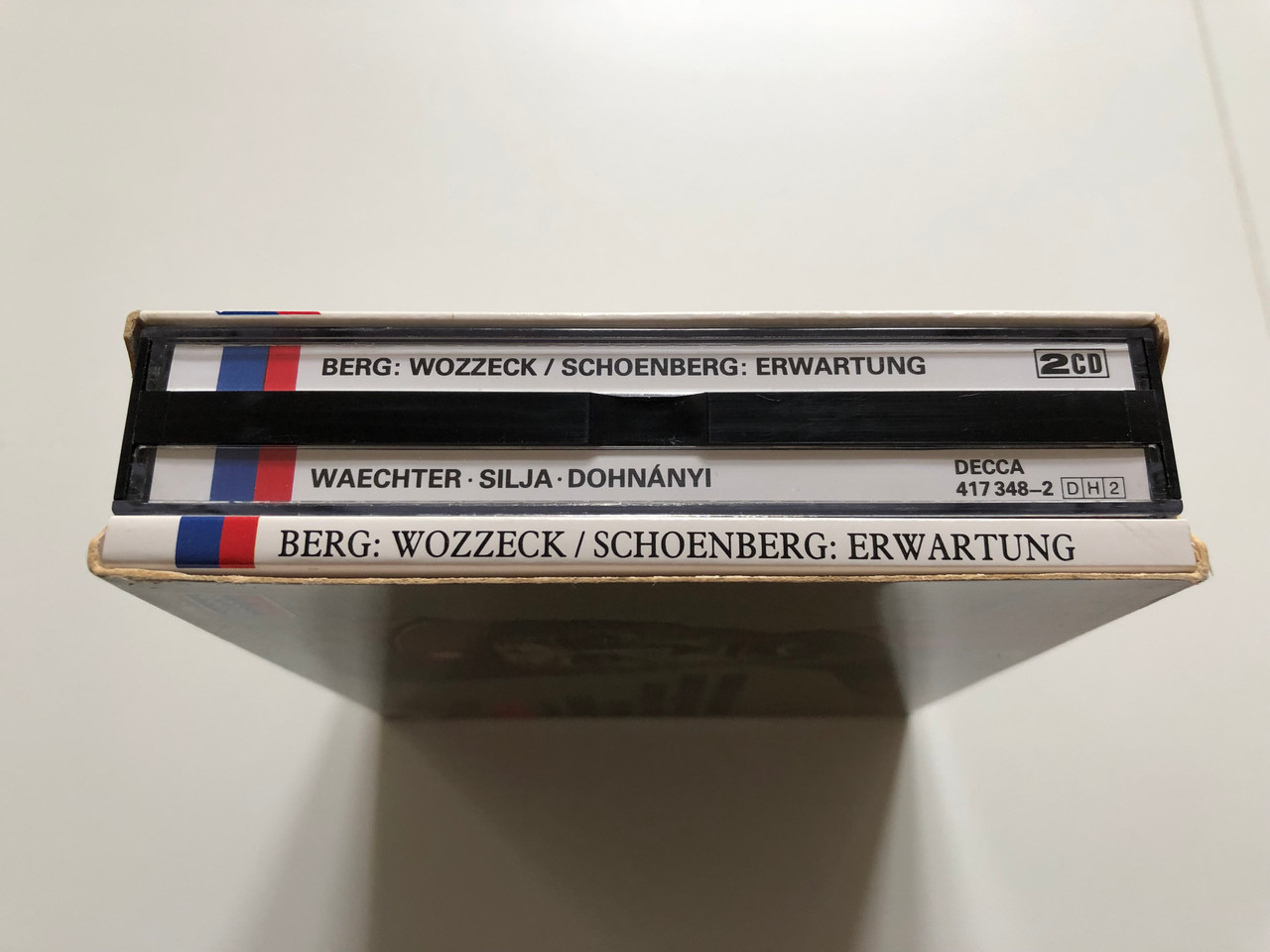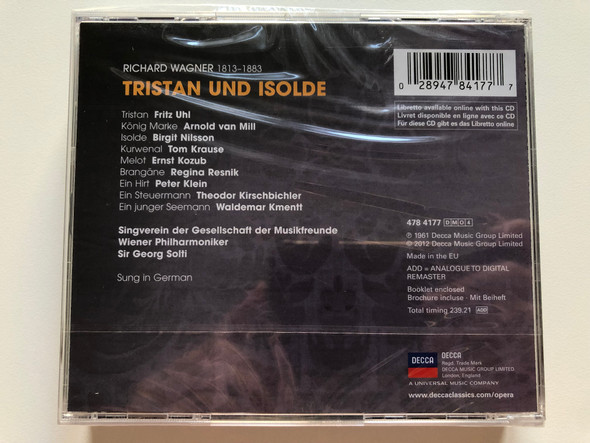Description
Berg - Wozzeck, Schoenberg - Erwartung / Anja Silja, Eberhard Wächter, Wiener Philharmoniker, Christoph von Dohnányi / Decca 2x Audio CD / 417 348-2
UPC 028941734822
Wozzeck (German pronunciation: [ˈvɔtsɛk]) is the first opera by the Austrian composer Alban Berg. It was composed between 1914 and 1922 and first performed in 1925. The opera is based on the drama Woyzeck, which the German playwright Georg Büchner left incomplete at his death. Berg attended the first production in Vienna of Büchner's play on 5 May 1914, and knew at once that he wanted to base an opera on it. (At the time, the play was still known as Wozzeck, due to an incorrect transcription by Karl Emil Franzos, who was working from a barely-legible manuscript; the correct title would not emerge until 1921.) From the fragments of unordered scenes left by Büchner, Berg selected 15 to form a compact structure of three acts with five scenes each. He adapted the libretto himself, retaining "the essential character of the play, with its many short scenes, its abrupt and sometimes brutal language, and its stark, if haunted, realism..."
The plot depicts the everyday lives of soldiers and the townspeople of a rural German-speaking town. Prominent themes of militarism, callousness, social exploitation, and casual sadism are brutally and uncompromisingly presented. Toward the end of act 1, scene 2, the title character (Wozzeck) murmurs, "Still, all is still, as if the world died," with his fellow soldier Andres muttering, "Night! We must get back!" seemingly oblivious to Wozzeck's words. A funeral march begins, only to transform into the upbeat song of the military marching band in the next scene. Musicologist Glenn Watkins considers this "as vivid a projection of impending world doom as any to come out of the Great War ...."
Erwartung (Expectation), Op. 17, is a one-act monodrama in four scenes by Arnold Schoenberg to a libretto by Marie Pappenheim. Composed in 1909, it was not premiered until 6 June 1924 in Prague conducted by Alexander Zemlinsky with Marie Gutheil-Schoder as the soprano. The opera takes the unusual form of a monologue for solo soprano accompanied by a large orchestra. In performance, it lasts for about half an hour. It is sometimes paired with Béla Bartók's opera Bluebeard's Castle (1911), as the two works were roughly contemporary and share similar psychological themes. Schoenberg's succinct description of Erwartung was as follows:
In Erwartung the aim is to represent in slow motion everything that occurs during a single second of maximum spiritual excitement, stretching it out to half an hour.
Philip Friedheim has described Erwartung as Schoenberg's "only lengthy work in an athematic style", where no musical material returns once stated over the course of 426 measures. In his analysis of the structure, one indication of the complexity of the music is that the first scene of over 30 bars contains 9 meter changes and 16 tempo changes. Herbert Buchanan has countered this description of the work as "athematic", and the general impression of it as "atonal", in his own analysis.
The musicologist Charles Rosen has said that Erwartung, along with Berg's Wozzeck and Stravinsky's The Rite of Spring, is among the "impregnable" "great monuments of modernism."
| Label: | Decca – 417 348-2 |
|---|---|
| Format: |
2 x CD
|
| Country: | Germany |
| Released: | |
| Genre: | Classical |
| Style: | Opera, Modern |
Tracklist:
| Wozzeck, Act One, Scene 1 | |||
| 1-1 | Berg– | Langsam, Wozzeck, Langsam! (Hauptmann) | 5:37 |
| 1-2 | Berg– | Wir Armen Leut! Sehn Sie, Herr Hauptmann, Geld, Geld! (Wozzeck) | 3:16 |
| |
Scene 2 |
||
| 1-3 | Berg– | Du, Der Platz Ist Verflucht! (Wozzeck) | 7:06 |
| |
Scene 3 |
||
| 1-4 | Berg– | Tschin Bum, Tschin Bum, Bum, Bum, Bum! (Marie) | 5:00 |
| 1-5 | Berg– | Wer Da? (Marie) | 4:00 |
|
Scene 4 |
|||
| 1-6 | Berg– | Was Erleb' Ich, Wozzeck? (Doktor) | 8:07 |
|
Scene 5 |
|||
| 1-7 | Berg– | Geh' Einmal Vor Dich Hin! (Marie) | 3:13 |
|
Act Two, Scene 1 |
|||
| 1-8 | Berg– | Was Die Steine Glänzen? (Marie) | 3:08 |
| 1-9 |
Berg– |
Was Hast Da? (Wozzeck) | 2:29 |
|
Scene 2 |
|||
| 1-10 |
Berg– |
Wohin So Eilig, Geehrtester Herr Sargnagel? (Hauptmann) | 4:18 |
| 1-11 | Berg– | He Wozzeck! Was Hetzt Er Sich So An Uns Vorbei? (Doktor) | 4:56 |
| |
Scene 3 |
||
| 1-12 | Berg– | Guten Tag, Franz (Marie) | 4:49 |
| |
Scene 4 |
||
| 1-13 | Berg– | Ich Hab' Ein Hemdlein An, Das Ist Nicht Mein... (Erster Handwerksbursche) | 1:50 |
| 1-14 | Berg– | Er! Sie! Teufel! (Wozzeck) | 3:31 |
| 1-15 | Berg– | Jedoch, Wenn Ein Wanderer, Der Gelehnt Steht An Dem Strom Der Zeit (Erster Handwerksbursche) | 4:57 |
| |
Scene 5 |
||
| 1-16 | Berg– | Andres! Andres! Ich Kann Nicht Schlafen (Wozzeck) | 5:01 |
| Act Three, Scene 1 | |||
| 2-1 | Berg– | "Und Ist Kein Betrug In Seinem Munde Erfunden Worden"... (Marie) | 4:45 |
|
Scene 2 |
|||
| 2-2 | Berg– | Dort Links Geht's In Die Stadt (Marie) | 5:07 |
|
Scene 3 |
|||
| 2-3 | Berg– | Tanzt Alle; Tanzt Nur Zu, Springt, Schwitzt Und Stinkt (Wozzeck) | 3:04 |
|
Scene 4 |
|||
| 2-4 | Berg– | Das Messer? Wo Ist Das Messer? (Wozzeck) | 7:53 |
|
Scene 5 |
|||
| 2-5 | Berg– | Ringel, Ringel, Rosenkranz, Ringelreih'n (Kinder) | 1:43 |
| |
Erwartung, Scene 1 |
||
| 2-6 | Schoenberg– | Hier Hinein? Man Sieht Den Weg Nicht... | 2:47 |
| |
Scene 2 |
||
| 2-7 | Schoenberg– | Ist Das Noch Der Weg? Hier Ist Es Eben | 2:51 |
| |
Scene 3 |
||
| 2-8 | Schoenberg– | Da Kommt Ein Licht! | 1:53 |
| |
Scene 4 |
||
| 2-9 | Schoenberg– | Er Ist Auch Nicht Da... | 2:59 |
| 2-10 | Schoenberg– | Es Ist Noch Da... Herrgott Im Himmel | 6:07 |
| 2-11 | Schoenberg– | Aber So Seltsam Ist Dein Auge... | 2:16 |
| 2-12 | Schoenberg– | Du Siehst Wieder Dort Hin? | 1:40 |
| 2-13 | Schoenberg– | Oh! Nicht Einmal Die Gnade, Mit Dir Sterben Zu Dürfen... | 3:29 |
| 2-14 | Schoenberg– |
Liebster, Liebster, Der Morgen Kommt... | 4:25 |
- Baritone Vocals – Eberhard Wächter, Franz Wächter
- Bass Vocals – Alexander Malta, Alfred Šramek
- Chorus – Chor Der Wiener Staatsoper
- Chorus Master – Norbert Balatsch
- Composed By – Berg (tracks: 1-1 to 2-5), Schoenberg (tracks: 2-6 to 2-14)
- Conductor – Christoph von Dohnányi
- Engineer – James Lock (2), Simon Eadon (tracks: 1-1 to 2-5)
- Illustration [Box Top/Slip Case Illustration] – David Dragon*
- Mezzo-soprano Vocals – Gertrude Jahn
- Orchestra – Wiener Philharmoniker
- Producer – Christopher Raeburn, Michael Haas (3) (tracks: 1-1 to 2-5)
- Soprano Vocals – Anja Silja
- Tenor Vocals – Heinz Zednik, Hermann Winkler, Horst Laubenthal*, Michael Pabst, Walter Wendig































